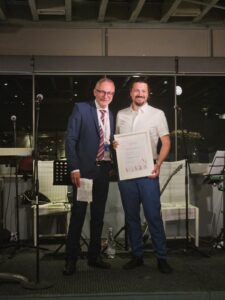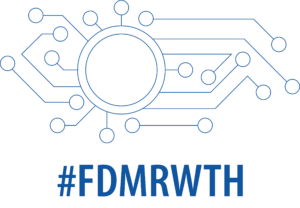
Source: Freepik
In today’s research, the correct handling of data is of crucial importance. The amount of research data is growing exponentially, and with it the need to manage this data efficiently and sustainably. This is where the FAIR principles come into play: Findable, Accessible, Interoperable, Re-Usable. These principles provide a common basis for handling research data and make it possible not only to store data, but also to make it usable and accessible. FAIR Digital Objects (FDOs) are a concept that transfers these principles to the digital world.
EUNIS Congress Awards – Elite Award for Best Practice
A remarkable example of the successful implementation of the FAIR principles in research data management was recently honored at the EUNIS Congress Award. The “European University Information Systems” organization – EUNIS for short – presents various awards each year to recognize outstanding projects in the field of university IT.
The Main Elite Award for Best Practice in the Use of Information Systems in Higher Education went to the team from RWTH Aachen University, consisting of Marius Politze, Benedikt Heinrichs, Sirieam Hunke, Ilona Lang and Thomas Eifert. Their project FAIR Digital Objects: FAIRtilizer for the Digital Harvest received this award for the outstanding implementation of the FAIR principles in digital research data management.
What Are FAIR Digital Objects?
FAIR Digital Objects are digital objects that comply with the FAIR principles. This means that they are designed in such a way that they are easy to find, accessible, interoperable and reusable. This is particularly important in research, where data often needs to be shared and used across different platforms and systems. FDOs provide a standardized way to meet these requirements and ensure that data remains usable in the long term.
Integration With Cloud Storage Systems
A key advantage of FAIR Digital Objects is their integration with enterprise-grade cloud storage systems. These systems provide the scalability and flexibility needed to manage large volumes of research data. By combining FDOs with cloud storage systems, research institutions can ensure that their data is not only stored securely, but can also be managed and used efficiently.
Connection to Gaia-X and Data Spaces
The integration of FDOs and cloud storage systems makes it possible to benefit from the concepts of data spaces defined as part of Gaia-X. Gaia-X is a European initiative that aims to create a secure and trustworthy data infrastructure. By connecting FDOs to Gaia-X, research institutions can ensure that their data not only complies with the FAIR principles, but can also be stored and used in a secure and trusted environment.
Implementation in Coscine
One concrete example of the implementation of these concepts is the Coscine research data management platform. The platform, which is available to researchers in NRW, enables access to a shared, georedundant storage system, the Research Data Storage. Coscine creates FAIR Digital Objects to ensure that the stored data complies with the FAIR principles and thus remains usable in the long term.
Conclusion
FAIR Digital Objects offer a promising opportunity to improve the handling of research data. By combining them with cloud storage systems and integrating them into initiatives such as Gaia-X, research institutions can ensure that their data is not only managed securely and efficiently, but also remains usable in the long term. Platforms such as Coscine demonstrate how these concepts can be implemented in practice and offer researchers a powerful solution for research data management. Recognition through prestigious awards such as the EUNIS Award and the Elite Award confirms the innovative character and important role of FAIR Digital Objects in the modern research environment.
Learn More
Do you have any questions or comments about FDO or RDM in general? Then simply write a message to the IT ServiceDesk. The FDM team looks forward to hearing from you.
Responsible for the content of this article is Arlinda Ujkani.






Leave a Reply
You must be logged in to post a comment.